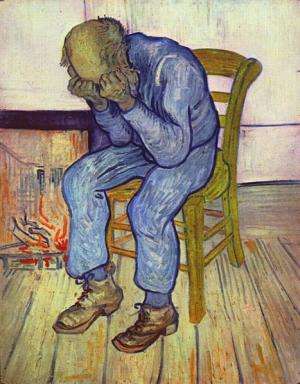March 25, 2014 report
Study suggests people with galanin variant more susceptible to stress-induced depression

(Medical Xpress)—A research team with members from Hungary, Sweden and the U.K. has found a link between a galanin variant and people who develop depression after experiencing a high degree of stress. In their paper published in Proceedings of the National Academy of Sciences, the team describes how they applied statistical methods to the medical histories of 2,361 people from the U.K. and Hungary, and found patterns regarding galanin levels and depression.
For many years, biological researchers have focused on the neurotransmitters serotonin and noradrenalin when investigating the cause of depression in people—because links have been found. Because of that, drugs developed to fight depression mainly involve causing changes to either or both. But many patients don't respond to such treatment, which suggests something else may be involved as well. In this latest effort, the researchers looked at a brain chemical called galanin—it's a peptide believed to be involved in sleep, hunger recognition, blood pressure and mood.
To find out if galanin might play a role in depression, the researches accessed the medical records of 2,361 white European patients and performed various types of statistical analysis on the data they found. In so doing, they discovered a pattern—people who had a certain galanin variant and who also experienced a traumatic, stressful event, tended to be more likely to develop depression than people who had experienced a similar event, but did not have the variant. This pattern suggests that people who have the galanin variant are more vulnerable to developing depression if they happen to experience a traumatic event. It also suggests that depression, as has been suggested by many researchers, is caused by a combination of genetic and environmental factors, rather than just one or the other, as others have maintained.
Prior research has found that traumatic stress that can contribute to depression can range from child abuse to a traumatic physical event later in life such as being raped or harmed in other ways. But the same studies show that not everyone who experiences such events develops depression. The results of this latest study suggest that the difference might lie in whether a person has a galanin variant. If so, sometime in the near future, people who have the variant might be given medication to change its levels should they undergo a traumatic event, thus warding off a likely case of depression.
More information: Brain galanin system genes interact with life stresses in depression-related phenotypes, Gabriella Juhasz, PNAS, DOI: 10.1073/pnas.1403649111
Abstract
Galanin is a stress-inducible neuropeptide and cotransmitter in serotonin and norepinephrine neurons with a possible role in stress-related disorders. Here we report that variants in genes for galanin (GAL) and its receptors (GALR1, GALR2, GALR3), despite their disparate genomic loci, conferred increased risk of depression and anxiety in people who experienced childhood adversity or recent negative life events in a European white population cohort totaling 2,361 from Manchester, United Kingdom and Budapest, Hungary. Bayesian multivariate analysis revealed a greater relevance of galanin system genes in highly stressed subjects compared with subjects with moderate or low life stress. Using the same method, the effect of the galanin system genes was stronger than the effect of the well-studied 5-HTTLPR polymorphism in the serotonin transporter gene (SLC6A4). Conventional multivariate analysis using general linear models demonstrated that interaction of galanin system genes with life stressors explained more variance (1.7%, P = 0.005) than the life stress-only model. This effect replicated in independent analysis of the Manchester and Budapest subpopulations, and in males and females. The results suggest that the galanin pathway plays an important role in the pathogenesis of depression in humans by increasing the vulnerability to early and recent psychosocial stress. Correcting abnormal galanin function in depression could prove to be a novel target for drug development. The findings further emphasize the importance of modeling environmental interaction in finding new genes for depression.
© 2014 Medical Xpress
















